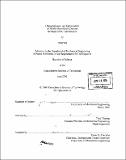Characterization and optimization of PDMS microfluidic devices for rapid DNA hybridization
Author(s)
Hu, Jenny (Jenny Ezu)
DownloadFull printable version (3.640Mb)
Other Contributors
Massachusetts Institute of Technology. Dept. of Mechanical Engineering.
Advisor
Todd Thorsen.
Terms of use
Metadata
Show full item recordAbstract
Two elastomeric microfluidic devices were designed for the purpose of conducting rapid, flow-based, multiplexed DNA hybridization. Experimental results showed that flowing hybridization assays could detect similar concentrations of labeled probe as standard stationary microarrays, but in 1/100h of the time, using 2% of the sample volume. An 8-channel device was used to spot glass slides with 64 hybridization assays and generate data supporting a theoretical model of DNA hybridization in both traditional stationary microarrays and flowing sample arrays. Larger devices were also used to create rrays of 96x96 spots on a single slide, demonstrating the scalability of the technology. Protocols were written and optimized for the use of both chips, allowing the technology to be distributed to collaborating labs for further development.
Description
Thesis (S.B.)--Massachusetts Institute of Technology, Dept. of Mechanical Engineering, 2005. Includes bibliographical references (p. 51-53).
Date issued
2005Department
Massachusetts Institute of Technology. Department of Mechanical EngineeringPublisher
Massachusetts Institute of Technology
Keywords
Mechanical Engineering.